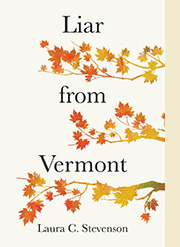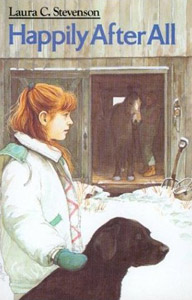A New Series: One Minute Reviews of
Books by Vermont Authors
Laura's column "One Minute Reviews" has appeared bi-weekly in Wilmington, Vermont's Deerfield Valley News since 2015. In April 2018, she found that no Vermont periodical consistently reviews all commercially published fiction and non-fiction by Vermont authors, so she started a series to fill that void. Published reviews from that series and some earlier reviews of local authors are listed with links to a scan of the printed copy. Reviews still in queue are listed without links until they appear in print.
The books reviewed in this series are available through Wilmington's Pettee Memorial Library, the Whitingham Free Public Library, and locally owned Bartleby's Books in Wilmington.
Deerfield Valley News, 6/16/2022
A Novel About Grief and Forgiveness
Susan Speranza, Ice Out: A Novel. She Writes Press, 2022
On the first snowy day in December, Francesca, her husband Ben, and their four-year-old daughter Addie ride Ben’s new snowmobile through the Vermont woods where they have built the house of their dreams. Suddenly, the snowmobile veers too close to the lake, tips over, and sinks, imprisoning Francesca and Addie in the icy water. Ben pulls himself out, but instead of turning back to save them, he turns away and rushes into the woods. Francesca, unbelieving and abandoned, sinks into the water, alternately rising to the surface to look for Addie and bitterly remembering a perfect life dissolved in an instant. Speranza describes that life in great detail: Francesca’s meeting Ben, their engagement, their marriage, their acquisition of their golden retriever, Addie’s birth, and her own work as a music teacher at a nearby school. In all their lives together, Francesca has assumed that she can trust Ben completely, and that the future is as much under her control as the music she plays so beautifully on the flute—a belief shattered by her helplessness amidst the ice.
The third-person narrative then switches to Ben, focusing on his relationship with his twin sister Lucy, his emotional paralysis after the accident in which she died at seventeen, and the grief that so froze the family that they still can’t talk about their loss. The reader begins to see that Ben’s panicked fear of losing someone he loves explains his inexplicable fall and absence during Francesca’s labor—and again, his paralyzing shock after the accident: “his fear of death was greater than his love for his wife and his daughter.” For Francesca, however, “the love of her daughter was greater than her fear of death,” and thinking (or imagining) she has seen their dog drag Addie from the water to the far shore, she swims after them.
As she swims (apparently under the ice), the realism of the backstories in the book’s first three quarters changes to magical realism. Francesca rises out of the ice into a dark wood, inhabited by the souls of women whose husbands or lovers have left them to die. They are bitter and vengeful: when the abandoning husbands appear, the women torture them. Confronted with this nightmarish scenario, Francesca realizes that saving Addie involves remembering her love for Ben, so he (and she, and Addie) can go on. The woman whose opening line is I wish there was a god, so I could hate him turns to love and forgiveness. Having saved Ben from the tortures of the frozen women in the woods, she sends, through him, a truly beautiful spiritual gift to her daughter—and having done that, she walks into the dawn of a summer afterlife.
The shift from detailed realistic description of a successful Vermont couple to the nightmare in the woods would test the skills of a Gabriel Garcia Marquez. Skills of that magnitude are beyond Speranza’s reach; while teeming with perceptions, the quiet, measured tone of Francesca’s drowning memories often strains the reader’s credulity, and her dying visions tend to be confusing rather than magical. But behind the book’s concluding pages—and in fact, behind the whole book—there clearly lies deep personal acquaintance with loss, grief, betrayal, and at the end of an interminable night, acceptance of death. In its best moments, Ice Out is a moving testimony to the power of love, written by a wise woman who knows how difficult it is to be forgiving.


